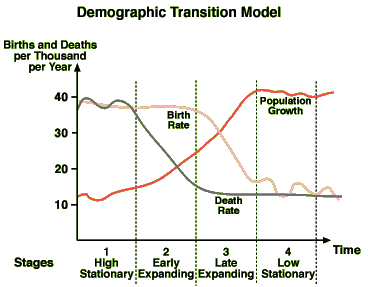
Stage 1: High fluctuation - high birth rate and death rates - however population growth is small.
Reasons for high birth rate include:
- Limited birth control
- high infant mortality rate encourages the birth of more children
- children are seen as a future source of income, therefore it would be more economically beneficial to have more kids.
Reasons for high death rate:
- high incidence of disease
- poor nutrition and famine
- poor levels of hygene
Stage 2: High birth rate but falling death rate. The total population begins to expand rapidly.
Reasons for falling death rate:
- Improved public health
- Better nutrition
- Lower child mortality
Stage 3: Falling birth rate, continuing falling death rate. The population growth slows down.
Reasons for falling birth rate include:
- Preferences for smaller families (cheaper)
- Changes in social trends and fashions
- Rise in materialism (i.e. would rather spend money on expensive goods than pay for more kids)
- Lower infant mortality rate
Stage 4:low fluctuating, low birth rate and low death rate. The population growth is small, and fertility continues to fall. There are changes in personal life styles, and more women are in the work force, therefre less couples are having kids (they'd rather get their careers sorted out first).
Stage 5: Death rate slightly exceeds the birth rate, and this causes population decline. This stage has only been recently recognised, and there are very few countries that are considered in stage 5.
Reasons for low birth rate include:
- A rise in individualism
- Greater financial independence of women
- lack of resources for future generations
- an incease in non traditional lifestyles.
By Kate and Nick
Comments (0)
You don't have permission to comment on this page.